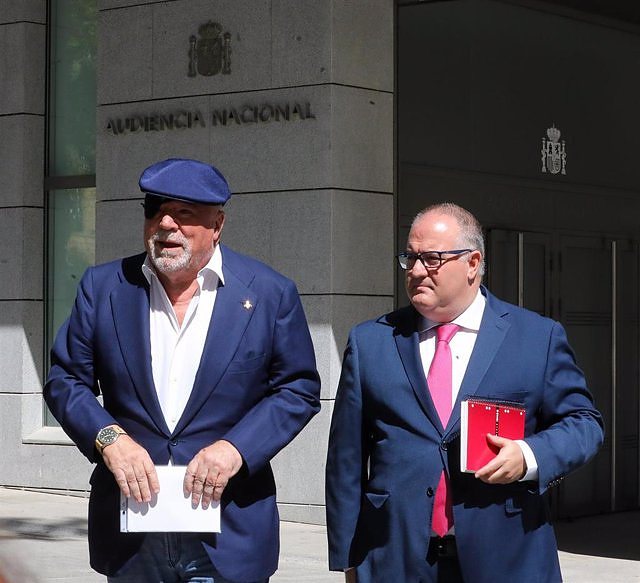It will only inquire into what is related to the case, although they house information about the coup d'état of 23-F, the GAL or ETA
MADRID, 3 Feb. (EUROPA PRESS) -
The judge of the National Court instructing the 'Tandem case', Manuel García Castellón, has agreed that the Cybercrime Unit of the General Information Commissioner proceed to digitize the microtapes, CDs and diskettes that were seized from the retired commissioner José Manuel Villarejo at his home in November 2017 and that they would house information from the 70s, 80s and 90s on issues such as the coup d'état of 23-F, the GAL or ETA.
This is how he leaves it in writing in an order dated January 31, to which Europa Press has had access, in which he points out that to date of that box of tapes -filed in the court as evidence BE38- only made a photographic report in 2020. Now he wants forensic copies of each of those microtapes as well as their registration and analysis.
In the operative part of the order, the judge gives the unit in charge of that cloned one month -although he adds that it is extendable-, which begins to count from the unsealing of the safe that contains them. And he warns that a lawyer from the Administration of Justice will be present at all times during the opening of the evidence to "prove the correct determination of the chain of custody of the seized computer effects."
The circumstance arises that in June 2022 the magistrate had to suspend a judicial declaration by Villarejo when he could not find the key that opened that safe deposit box where the microtapes are kept.
Now, with this unsealing, the judge intends to advance in the investigation, within the framework of piece 31 of the case, and for this reason only agrees to study the copies that may have documentation "directly related to the facts under investigation in the present case ".
"In the event that in the course of the diligence new facts are discovered that could constitute a criminal offense other than the one that is the subject of the authorization, the judicial authority must be immediately notified, so that it can agree on what is appropriate" , Add.
In the order, the magistrate dedicates a good number of pages to warn of the special precautions that must be followed when analyzing devices seized from family homes since they may contain information that affects the privacy of the person investigated and that has nothing to do with it. with the investigations.
However, it reasons that in the present case the facts are of a "serious nature" because initially they have been classified as crimes of discovery and disclosure of secrets, crimes of criminal organization for the commission of serious crimes, money laundering and bribery. And in his opinion, this "makes it proportional to access the interested request" by the Prosecutor's Office to obtain a report on the microtapes.
In addition, the magistrate indicates that the fact that the Police are authorized to investigate by searching all the stored data "does not mean that they will access the privacy of all that data." And he points out that there are forensic tools that use "search engines that make it possible to find certain files on a computer or computer system without having to show the content of all the files on which the search is carried out." Thus, he assures him, "the privacy of the affected person is safeguarded, despite the analysis of all his files."
Villarejo has repeatedly requested the judicial headquarters to return those microtapes, although without success. This was expressed in a last letter, forwarded by 'ABC', to which the Anti-Corruption Prosecutor responded by advising that they be delivered, but asking the retired police officer to identify their content, in order to determine if they could have any relevance to the inquiries.

 Exploring Cardano: Inner Workings and Advantages of this Cryptocurrency
Exploring Cardano: Inner Workings and Advantages of this Cryptocurrency Seville.- Economy.- Innova.- STSA inaugurates its new painting and sealing hangar in San Pablo, for 18 million
Seville.- Economy.- Innova.- STSA inaugurates its new painting and sealing hangar in San Pablo, for 18 million Innova.- More than 300 volunteers join the Andalucía Compromiso Digital network in one month to facilitate access to ICT
Innova.- More than 300 volunteers join the Andalucía Compromiso Digital network in one month to facilitate access to ICT Innova.-AMP.- Ayesa acquires 51% of Sadiel, which will create new technological engineering products and expand markets
Innova.-AMP.- Ayesa acquires 51% of Sadiel, which will create new technological engineering products and expand markets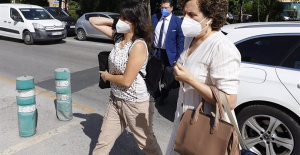 Juana Rivas's legal team manages to repeat the trial "that separated the brothers" in Italy
Juana Rivas's legal team manages to repeat the trial "that separated the brothers" in Italy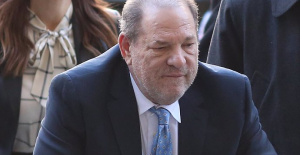 The New York Justice annuls Harvey Weinstein's conviction for sexual crimes and orders a new trial
The New York Justice annuls Harvey Weinstein's conviction for sexual crimes and orders a new trial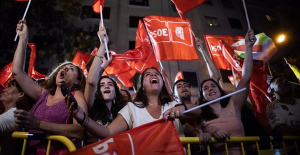 Socialist militants promote a large demonstration in support of Sánchez on Saturday in Ferraz
Socialist militants promote a large demonstration in support of Sánchez on Saturday in Ferraz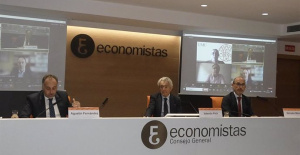 Families with average income allocate a third of their income to paying taxes, according to economists
Families with average income allocate a third of their income to paying taxes, according to economists How Blockchain in being used to shape the future
How Blockchain in being used to shape the future Not just BTC and ETH: Here Are Some More Interesting Coins Worth Focusing on
Not just BTC and ETH: Here Are Some More Interesting Coins Worth Focusing on Retrópolis brings the golden age of video games and computing to the UPV
Retrópolis brings the golden age of video games and computing to the UPV Looking for video games that value the neighborhoods of Valencia
Looking for video games that value the neighborhoods of Valencia UPV researchers improve the efficiency of air conditioning systems using a geothermal heat pump
UPV researchers improve the efficiency of air conditioning systems using a geothermal heat pump València is committed to citiverse and smart tourism to be "the reference technological hub of the Mediterranean"
València is committed to citiverse and smart tourism to be "the reference technological hub of the Mediterranean" A million people demonstrate in France against Macron's pension reform
A million people demonstrate in France against Macron's pension reform Russia launches several missiles against "critical infrastructure" in the city of Zaporizhia
Russia launches several missiles against "critical infrastructure" in the city of Zaporizhia A "procession" remembers the dead of the Calabria shipwreck as bodies continue to wash up on the shore
A "procession" remembers the dead of the Calabria shipwreck as bodies continue to wash up on the shore Prison sentences handed down for three prominent Hong Kong pro-democracy activists
Prison sentences handed down for three prominent Hong Kong pro-democracy activists ETH continues to leave trading platforms, Ethereum balance on exchanges lowest in 3 years
ETH continues to leave trading platforms, Ethereum balance on exchanges lowest in 3 years Investors invest $450 million in Consensys, Ethereum incubator now valued at $7 billion
Investors invest $450 million in Consensys, Ethereum incubator now valued at $7 billion Alchemy Integrates Ethereum L2 Product Starknet to Enhance Web3 Scalability at a Price 100x Lower Than L1 Fees
Alchemy Integrates Ethereum L2 Product Starknet to Enhance Web3 Scalability at a Price 100x Lower Than L1 Fees Mining Report: Bitcoin's Electricity Consumption Declines by 25% in Q1 2022
Mining Report: Bitcoin's Electricity Consumption Declines by 25% in Q1 2022 Oil-to-Bitcoin Mining Firm Crusoe Energy Systems Raised $505 Million
Oil-to-Bitcoin Mining Firm Crusoe Energy Systems Raised $505 Million Microbt reveals the latest Bitcoin mining rigs -- Machines produce up to 126 TH/s with custom 5nm chip design
Microbt reveals the latest Bitcoin mining rigs -- Machines produce up to 126 TH/s with custom 5nm chip design Bitcoin's Mining Difficulty Hits a Lifetime High, With More Than 90% of BTC Supply Issued
Bitcoin's Mining Difficulty Hits a Lifetime High, With More Than 90% of BTC Supply Issued The Biggest Movers are Near, EOS, and RUNE during Friday's Selloff
The Biggest Movers are Near, EOS, and RUNE during Friday's Selloff Global Markets Spooked by a Hawkish Fed and Covid, Stocks and Crypto Gain After Musk Buys Twitter
Global Markets Spooked by a Hawkish Fed and Covid, Stocks and Crypto Gain After Musk Buys Twitter Bitso to offset carbon emissions from the Trading Platform's ERC20, ETH, and BTC Transactions
Bitso to offset carbon emissions from the Trading Platform's ERC20, ETH, and BTC Transactions Draftkings Announces 2022 College Hoops NFT Selection for March Madness
Draftkings Announces 2022 College Hoops NFT Selection for March Madness